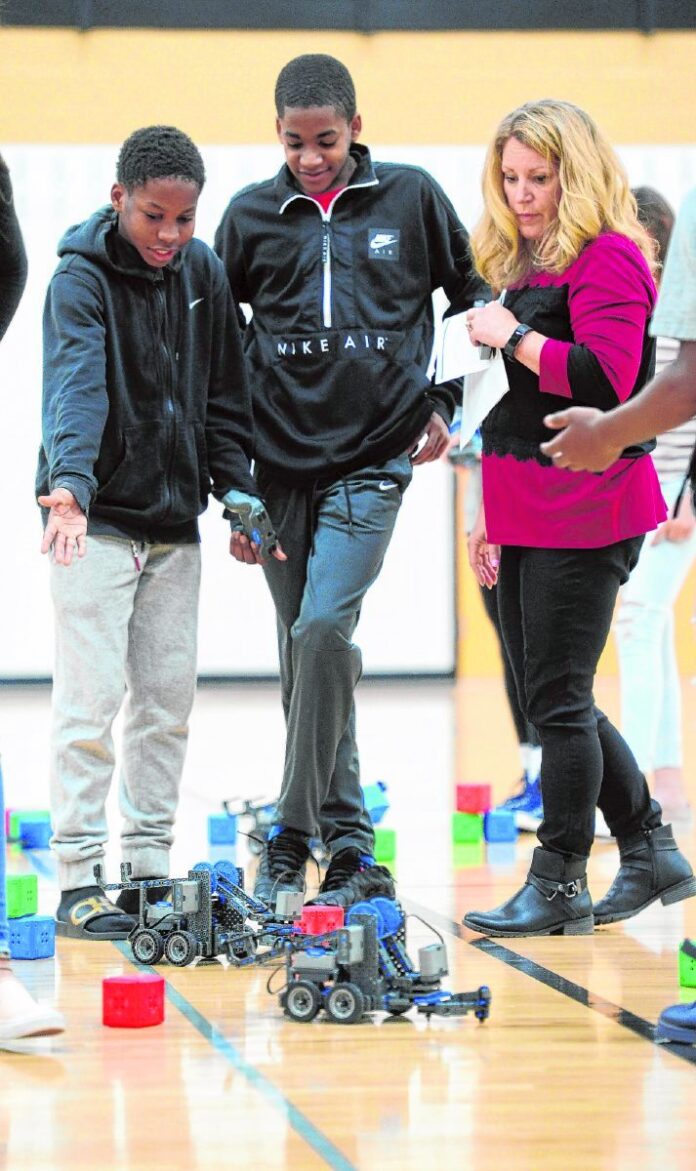
FORTVILLE — Mt. Vernon Middle School is getting a new robotics and engineering class thanks to a grant and a nomination from local farmers.
The school received a $15,000 grant from Bayer Pharmaceuticals. School districts across the U.S. were nominated and selected by a panel of teachers and farmers to receive science, technology, engineering and mathematics grants through the America’s Farmers Grow Rural Education program with Bayer.
Mt. Vernon’s funds will be used to support a second robotics and engineering course, specifically for eighth-grade students. It was one of six school districts in the state to receive the grant.
“Mt. Vernon has a rural, agricultural base to it, as seen in the school gardens, specific high school agriculture courses, (FFA) program and the local farming heritage,” a news release from the school corporation states. “However, as the school progresses and grows, the curriculum has integrated agriculture with STEM. Not only does the inclusion of more STEM classes accommodate a growing suburban population of students, but it also introduces a more technologically advanced approach for students to apply to their agriculture-related classes in the life sciences field.”
Brenda Schoenlein, who teaches robotics and engineering at Mt. Vernon Middle School, told the Daily Reporter in an email that the new Robotics/Engineering II course will start next semester. It will be a semester-long class available to students who have completed the Level I robotics/engineering course.
“All of these students have had experience with our robots and want to learn more,” Schoenlein said. “The demand for this class is overwhelming because our students have learned that they like building things with their hands and that they are good at it.”
The new class will be offered to 60 students every semester, Schoenlein continued. In it, students will build more complicated robots and learn how to program them to do specific tasks. It will provide classroom robotics kits and equipment like controllers, robot brains, motors, batteries, storage bins and practice fields.
“The study of robotics inherently relates to all facets of STEM, and when students learn through exploration, it increases their motivation and desire to learn and succeed,” Schoenlein said.
Schoenlein said a full-capacity 170 students are currently enrolled in Mt. Vernon Middle School’s Robotics/Engineering STEM I course, which has been offered for the past several years. The semester-long class teaches 340 students a year and is extremely popular among the sixth-, seventh- and eighth-graders, she continued.
“We talk a lot about problem-solving in our Robotics/Engineering STEM classes and when trying to figure out how to solve a problem, we relate it to real-world scenarios,” she said. “Where do we start? What’s the easiest fix? Where do we go now? Students learn real-world, problem-solving strategies that will teach them how to handle many problems that they may encounter later in life.”
Tristan Sitton, an eighth-grader at Mt. Vernon Middle School, told the Daily Reporter in a statement that he’s looking forward to the new course.
“I would like to see another more advanced robotics class in our middle school so we, as a school, could learn more about how technology is created and build harder and more sophisticated robots,” Tristan said.
Middle school students can continue to pursue engineering studies as they enter Mt. Vernon High School, said Scott Shipley, director of curriculum for the school corporation, who led the team of educators that applied for the grant.
Hancock County farmers Bob Cook and Courtney Wiedenhaupt nominated the school district to apply for the funds. Cook is a 1963 graduate of the former Mt. Comfort High School, and his children are Mt. Vernon graduates. He told the Daily Reporter he came across the nomination opportunity in one of the emails he gets from various chemical companies.
“Kids need things other than just book learning,” he said. “They need some industrial-type skills, because one of these days, we’re going to have a lot more industry in the United States I think than we do now. I think it’s going to come back, and I think we’re going to need some people that want to design things, that want to go into manufacturing and be a highly skilled person.”




